Student Workshops
Self-directed learning for students
Student workshops are modules led and facilitated by student tutors. They provide a collaborative environment where students can work in small groups to independently develop and implement their own projects — fostering self-directed and practice-based learning.
From Winter Semester 2025/26, two formats will be offered:
Thematic Workshops and Project Workshops.
These can be taken as elective modules.
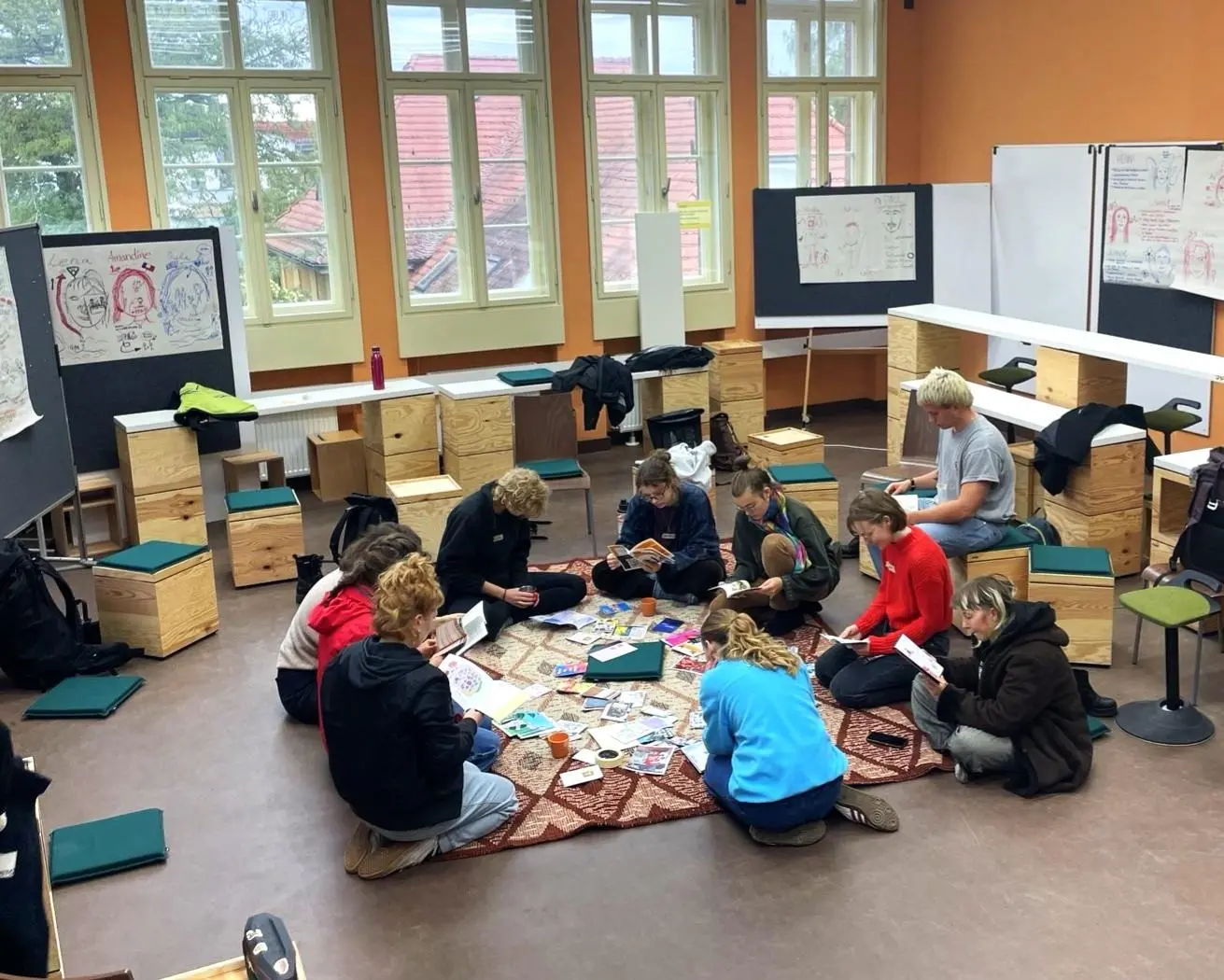
Project Workshop
Project Workshops are designed to give students the opportunity to practically implement a concrete project within the field of socio-ecological transformation, while developing applied, practice-based skills. Each project group is supported by student tutors, who take responsibility for both the organisational and academic progress of the project. Academic staff provide additional guidance as needed. Outcomes may include tangible deliverables such as reports, prototypes, or project milestones, and are accompanied by an individual self-reflection component. Active participation is required to meet the assessment requirements.
Thematic Workshop
Thematic Workshops offer students the opportunity to engage in a theoretical exploration of topics that are underrepresented from a student perspective. These workshops foster a critical and multi-perspective discussion culture, encouraging collaborative reflection and debate. The group process is guided by student tutors with subject-specific and methodological expertise, while academic staff provide targeted support as needed. Outcomes are centred around the transfer of knowledge and ideas, which are made visible through formats such as brochures, blogs, or videos. Students also complete an individual self-reflection component. Active participation is required as part of the assessment. Thematic Workshops can be taken as elective modules.

The project workshop was also presented at HIT.
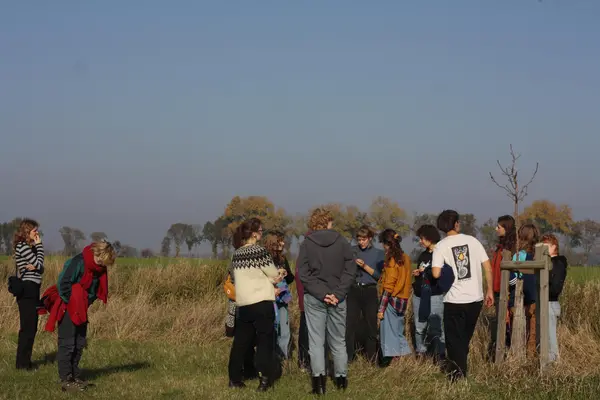
Spending time together is also a key benefit of the project workshop.
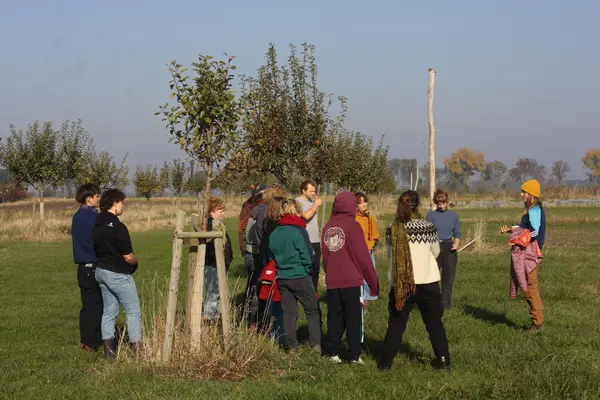
Guided Tour during the Excursion to the SoLaWi Farm Collective Basta in the Oderbruch
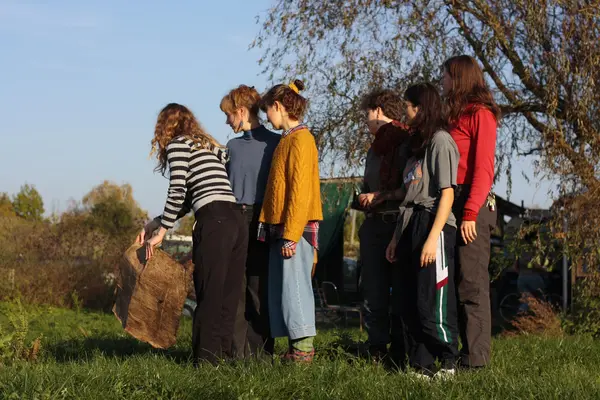
Students practise working together to find a solution through a group game.
What can you expect?
- Interdisciplinary collaboration and exchange with students from other degree programmes
- Hands-on experience through the practical development of your own project
- A peer-teaching format that fosters shared learning and mutual support
- 6 ECTS credits for both Bachelor's and Master's students
The content of each Student Workshop depends on the current offering and the students who lead them. Current Project Workshops include Gender and Climate Justice, Experiencing Learning, and Shaping Futures and Society.
Gender and Climate Justice
The Project Workshop “Gender and Climate Justice” explores the connections between gender (in)justice and the climate crisis. Its goal is to develop an intersectional understanding of power relations and to analyse the interactions between social, ecological, and economic dimensions of the climate crisis.
The workshop critically examines the links between patriarchal structures, colonial and neo-colonial legacies, neoliberal economic models, and global injustices. Participants are empowered as political agents to take responsibility for themselves and society.
Joint learning is fostered through creative and interactive methods, including the production of a zine, field trips, and interdisciplinary discussions. Social and emotional skills are developed to support sustainable social change. The workshop emphasises critical reflection on power and resource relations—particularly within agriculture and forestry—and encourages the development of alternative perspectives and utopias for a fairer future.
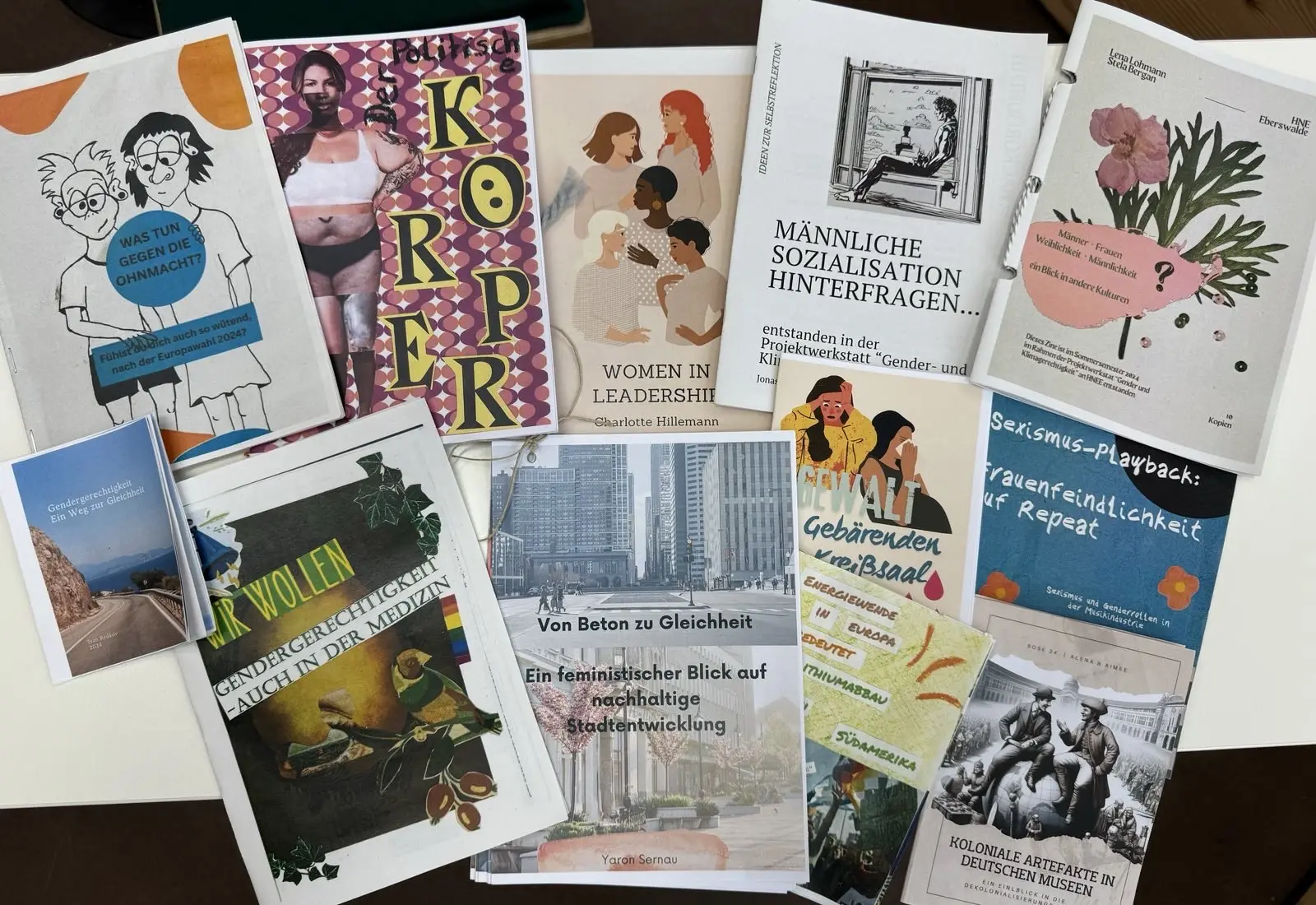
Shaping Futures and Society
The Project Workshop “Shaping Futures and Society” gives students the chance to engage with future scenarios and develop key competencies for navigating a VUCA world—characterised by volatility, uncertainty, complexity, and ambiguity. The workshop focuses on social, technological, economic, and ecological transformations, highlighting the malleability and diversity of possible futures. A core component is the exploration of sustainability, complemented by technological perspectives.
The workshop aims to foster both individual and collective design skills, encourage critical reflection on future challenges, and support the creation of imaginative scenarios that blend sustainability with technological innovation. Students work independently or in groups on projects, supported by student tutors, employing innovative methods such as design futuring and immersive technologies (e.g., virtual reality).
The semester is structured into three phases:
- Input phase — including lectures and field trips,
- Project phase — where students develop their own future scenarios individually or collaboratively
- Presentation phase — in which students present and reflect on their results
This workshop promotes creative, critical, and sustainable approaches to envisioning the future and provides a platform for interdisciplinary exchange and innovative thinking.

Former project workshops
Experiencing Learning
The “Experiencing Learning” project workshop responds to the challenges of an education system that often prioritises short-term outcomes, and instead focuses on long-term learning success and the development of self-efficacy. Its goal is to promote enjoyment, effectiveness, and efficiency in learning by developing and adapting innovative, student-driven approaches.
The workshop connects sustainability and Education for Sustainable Development (ESD), linking future-oriented learning with social and ecological awareness. It creates a platform for students from a range of disciplines to collaboratively develop new learning concepts, deepen their knowledge, and explore their personal strengths. The semester follows a modular structure—comprising input, project, and reflection phases—which allows participants to carry out their projects independently, share experiences, and reflect on their learning journey. Peer tutors accompany and support the process throughout.
As a flexible and recurring format, “Experiencing Learning” encourages students to see learning as a dynamic, enjoyable, and meaningful activity, while fostering innovative approaches to education.
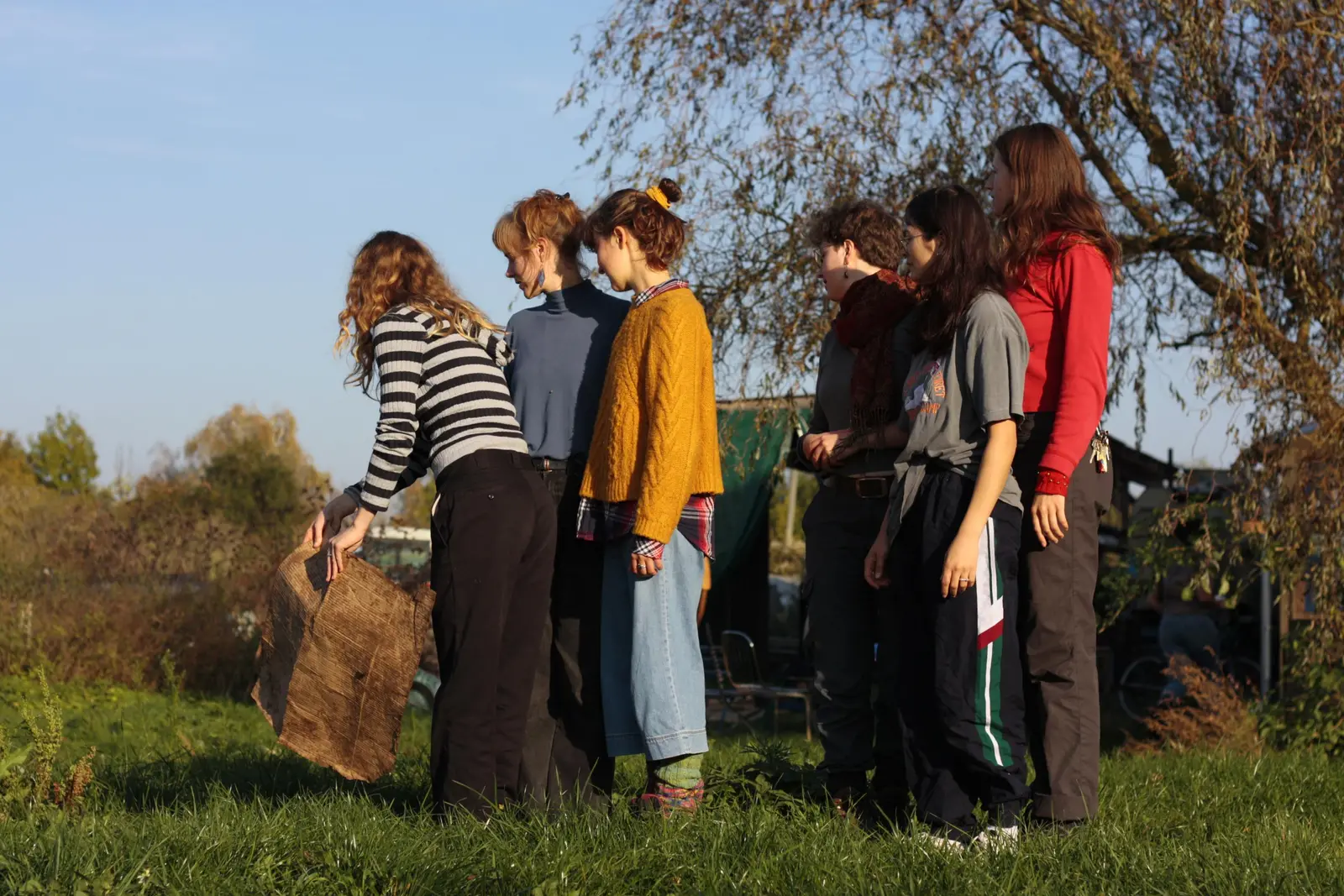
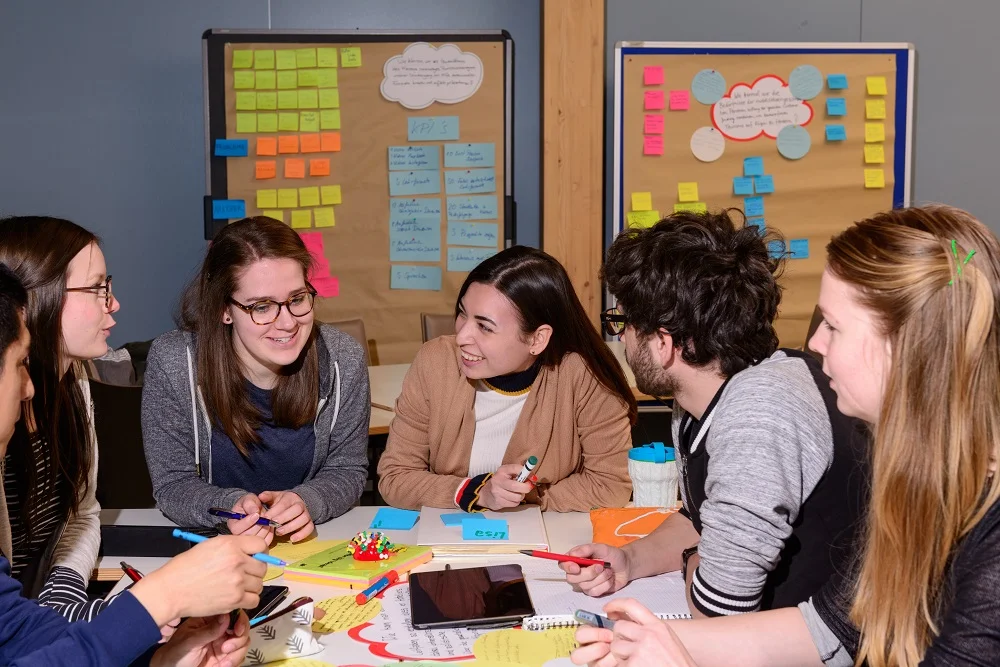
Learning in this project workshop followed a peer-to-peer model and became a commoning process in itself. Alongside content-based knowledge, the focus was on shared experiences, collaborative reflection, and co-creation. Voluntary and self-directed participation fostered strong group engagement and intrinsic motivation.
The interdisciplinary makeup of the group brought diverse perspectives into the process and enabled participants to explore the transformative potential of commons together. Insights generated throughout the group process extended beyond the semester and shaped everyday university life.
The project workshop was not conceived as a one-way transfer of knowledge, but as an open learning space where practical approaches could also be developed. Reflection was a central element, informed by theoretical models such as the commoning patterns described by Helfrich & Bollier (2019).
A shared kick-off weekend helped define goals, clarify roles, and organise the semester’s structure. Over the following weeks, participants worked independently on their chosen topics, reflected on their perspectives, and shared their results beyond the university setting—for example, through workshops or digital materials. Local partnerships and hands-on projects complemented the format.
One key outcome of this project workshop was a children’s picture book children's picture book that introduces the concept of the commons in accessible, age-appropriate language.
The project workshop is currently continuing as the Commons Working Group.